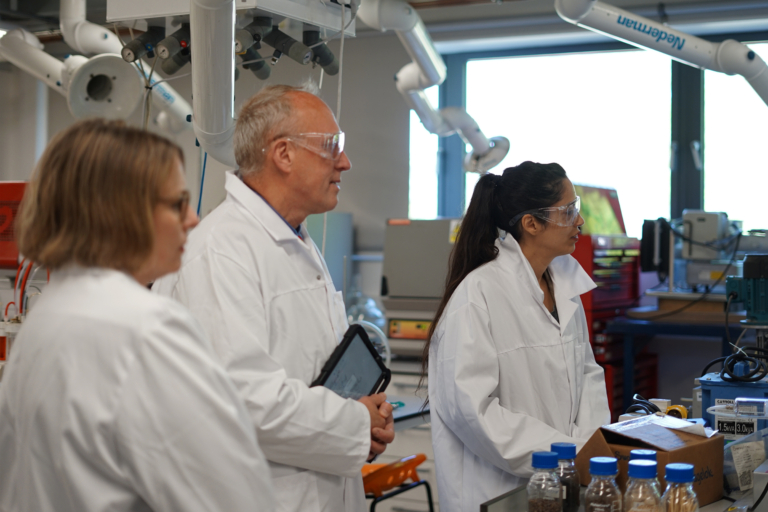Eight Centres of Doctoral Training (CDT’s) from across the Midlands Innovation (MI) partnership have received over £100m in funding to train the researchers of tomorrow in topics of national importance.
Described as the UK’s biggest-ever investment in engineering and physical sciences doctoral skills, the Engineering and Physical Sciences Research Council (EPSRC) are investing more than £1 billion into 65 centres for doctoral training. The funding is from a combination of £500 million from UK Research and Innovation and the Ministry of Defence, and a further £590 million from universities and business partners.
Strengths in sustainability, net zero and advanced manufacturing
Across the eight centres led by Midlands Innovation (MI) partners, there is evident strength in the areas of sustainability and sciences supporting the transition to a net zero economy. The distinct programmes are set to add several hundred doctoral students to the MI research community working in these fields, building on the critical mass of net zero and sustainability capabilities in the partnership.
Another theme emerging from the MI led centres is advanced manufacturing and engineering, with the Midlands nationally recognised as the manufacturing heartland of the UK. The doctoral centres at the University of Nottingham and University of Birmingham will lead research into decarbonising the manufacturing sector, and the University of Leicester centre will focus on transforming the metals industry with skills in data and artificial intelligence.
Professor Karen Holford CBE FREng, Chair of the Midlands Innovation Board and Chief Executive and Vice-Chancellor of Cranfield University welcomed the announcement: “The strength and relevance of the research we undertake across the Midlands Innovation partnership is demonstrated by the CDTs that have been announced for the Midlands. The new centres will play a central role in tackling the biggest challenges facing our region, nation and world today. This investment significantly strengthens our collective doctoral community and will help to train the future academics, industrialists and innovators that the Midlands and UK needs.”
Dr Helen Turner, Director of Midlands Innovation added: “The injection of funding to these doctoral centres demonstrates the unique expertise of our partners across a number of distinct, but closely related themes. The centres will put us at the forefront of innovations in crucial technologies and will play a critical role in shaping the future of industry and meeting the challenge of reaching net zero.”
More on the eight doctoral centres
The Aston University NET2Zero Centre will focus on the use of biomass to replace fossil fuels and removal (or capture) of CO2 from the atmosphere, with the potential to create new sources of fuels and chemicals. Integration of these two areas will lead to significant cost and energy savings.
The Birmingham EPSRC Centre for Doctoral Training in Formulation Engineering – Formulation for Net Zero will equip graduates with the skills to manufacture the next generation of formulated products at net zero. Formulated products, including foods, fuel cell and battery electrode materials, pharmaceuticals, paints, catalysts, structured ceramics, coatings, cosmetics, detergents and agrochemicals, are central to UK prosperity.
The Cranfield University EPSRC Centre for Doctoral Training in Net Zero Aviation is a collaboration with Cardiff and Strathclyde Universities and the National Centre for Atmospheric Science, and will be delivered in partnership with industry, training 64 students and driving research into novel, disruptive solutions that will decarbonise aviation.
Cranfield University’s Centre for Doctoral Training in Water Infrastructure and Resilience II (WIRe II) will equip 60 students with the skills and drive needed to help create a more water-secure world. WIRe II is a collaboration with Sheffield and Newcastle Universities giving students access to world-leading experimental water facilities.
The University of Leicester’s Centre for Doctoral Training (CDT) in Digital Transformation of Metals Industry (DigitalMetal) has been designed to meet a national, strategic need for training a new generation of technical leaders able to lead digital transformation of metals industry and its supply chain with the objective of increasing agility, productivity & international competitiveness of the metals industry in the UK.
The Centre for Doctoral Training (CDT) in Engineering Hydrogen Net Zero (EnerHY) at Loughborough University will play a central role in developing the skilled workforce needed to enable rapid growth in green hydrogen-related technology. Developed in partnership with Cranfield University and the University of Strathclyde, as well as more than 60 industry and civic partners, over 60 academics, with expertise in engineering, science, manufacturing and economics, will work together to train and support the future leaders of the hydrogen industry.
The University of Nottingham and Nottingham Trent University Centre for Doctoral Training (CDT) in Resilient Chemistry (Feedstock to Function) has received £12m in collaborative investment to train chemists of the future to find new ways to decarbonise manufacturing sectors, and help the East Midlands achieve its net zero target.
The University of Warwick Centre for Doctoral Training in Modelling of Heterogeneous Systems, known as HetSys II has been awarded £11m to train 50 PhD students to use computational modelling to tackle pressing global sustainability challenges from accessing clean fusion energy, controlling infectious diseases, to designing energy-efficient devices including themoelectrics and solar cells.
ENDS
Notes to Editors
About the Engineering and Physical Sciences Research Council (EPSRC)
The Engineering and Physical Sciences Research Council (EPSRC) is the main funding body for engineering and physical sciences research in the UK. Their portfolio covers a vast range of fields from digital technologies to clean energy, manufacturing to mathematics, advanced materials to chemistry.
About Centres for Doctoral Training (CDT)
A CDT trains doctoral students with each centre focused on a specific theme or topic. Most CDTs will support five cohorts (a new cohort starting each academic year) with a cohort supporting an average of thirteen students. Fourteen of the nationally announced new centres will have four cohorts rather than five.
EPSRC supports doctoral students through three training routes (Doctoral Training Partnerships, ICASE awards and CDTs), and in the last 30 years it has supported over 50,000 doctoral students.
EPSRC invests in world-leading research and skills, advancing knowledge and delivering a sustainable, resilient and prosperous UK. They support new ideas and transformative technologies which are the foundations of innovation, improving our economy, environment and society. Working in partnership and co-investing with industry, we deliver against national and global priorities.
Published 18 March 2024






